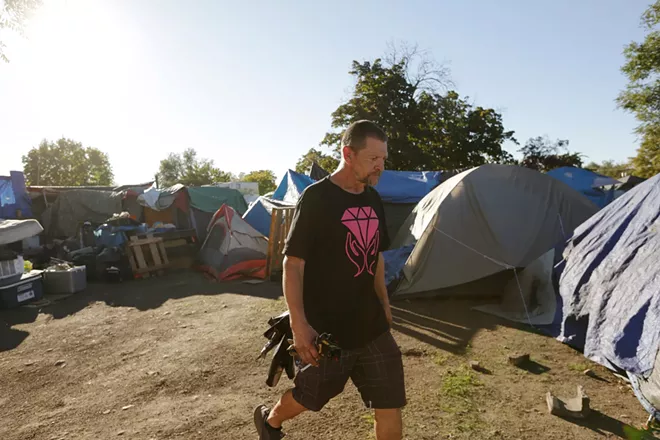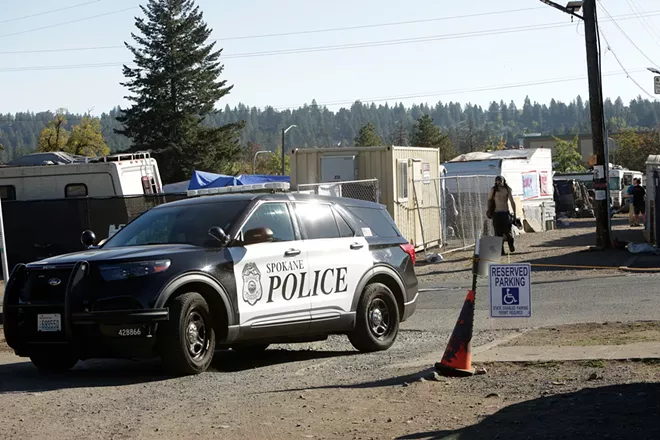
It's Thursday afternoon, and Daniel Rose is settling into his regular 3 to 11 pm security shift at Camp Hope.
It's a calm day at the East Central Spokane homeless encampment, which has an estimated 440 residents. As he sips an energy drink, Rose explains that he used to live at the camp, but recently moved into a clean and sober living facility. Jewels Helping Hands, the nonprofit that administers Camp Hope, hired him to do security work about three weeks ago.
Today, Rose's job is to watch the camp's south entrance, which is currently locked. The Washington State Department of Transportation, which owns the land the camp is on, erected a chain-link perimeter fence around the camp earlier in the month to address security concerns. It's taken some getting used to, Rose says.
Every five minutes or so, someone will try to enter the camp through the south gate, and Rose will have to tell them to go around to the other side. Most people react with mild annoyance, like with unexpected road construction in the middle of a morning commute.
"Please go through the front," Rose says as a man tries to enter through the locked gate.
"This is bullshit," the man says, shaking his head and walking away.
"I don't make the rules," Rose replies. "I only enforce them."
A month ago, Camp Hope was more of a free-for-all. People could come and go as they pleased from any part of the camp. Then the fence went up. There's also a new nighttime curfew, floodlights, a badging system and a list of rules campers have to sign off on if they want to stay. There are four separate entities doing security now: the Jewels Helping Hands Team, city police and two private companies employed by the city and WSDOT. There's also Sheriff Ozzie Knezovich's recent threats to clear the camp next month.
Just who the new security perimeter is there to protect — campers or neighborhood businesses — depends on who you ask. Camp residents say reactions to the new system have been somewhere between mixed and mostly positive.
"It stirred things up a little bit," says Robert Moody, another member of Jewels Helping Hands' eight-person security team. He also used to live at Camp Hope, but recently moved back in with his wife and son.
Chris Senn, who lives at Camp Hope and has worked on the security team for about seven months, says the new fence and security system has improved issues like theft and people coming to the camp to sell drugs. It also makes it easier for campers to prove they aren't the ones committing all the crimes in the neighborhood. If a local business reports an overnight theft, camp security can check the logs to see if anyone signed out of the camp at night.
Senn, like many unhoused people, is a military veteran. Dealing with misbehavior from the camp's residents isn't easy, he says, but it's still better than the rowdy soldiers he had to put up with when he spent 15 years in the Army's military police.
Senn says things have been pretty calm since the fence went up. Has it been perfect? No. Holes have been cut in the fence on several occasions, allowing people or illicit goods to sneak in and out undetected.
Unfortunately, Senn says, the most common issue he deals with at the camp is theft. But contrary to assertions from some elected officials, he says it's usually campers stealing from each other, not local businesses.
What's more, Senn has taken a few blows while trying to break up fights. But for the most part he says the crime, violence and drug use at the camp aren't as bad as people say.
While Senn is talking, a man walks into the camp, visibly agitated.
"If you're not on drugs, it looks a little f—ed up," the man says, commenting on the row of tents and RVs.
The man isn't homeless. He says he lives in a Washington city a few hours away, and he came here looking for his estranged daughter.
She's 21. He thinks he saw her here a few hours ago, but she ran off. He thinks she's on drugs and it's a sensitive situation, so he asks that I not include his name.
The man says the camp is a mess, and that everyone must be on drugs. Senn tries to explain that not everyone at the camp is some drug-crazed criminal. The man doesn't buy it and says Senn should get a job. Everywhere is hiring now, he says.
"Sorry you feel everyone's a bad person," Senn says. "We're not all bad."
Senn says he'll ask around and keep an eye out for the man's daughter. The man wanders off to keep looking.
It's not uncommon for people to come to the camp in search of missing loved ones, Senn says, adding that the security team always does everything it can to help find people's kids. (Minors aren't allowed in the camp.)
The man's comments were hurtful, Senn says, but as a parent himself, he understands his pain.
The four separate entities doing security work at Camp Hope have minimal collaboration.
The Spokane Police Department has two officers stationed at the camp from 7 am to 7 pm daily. The shifts are in addition to the regular patrols that officers do in the East Central neighborhood, so the police at Camp Hope get paid overtime. Brian Coddington, the mayor's spokesman, doesn't have the September numbers yet but says the overtime has cost the city more than $217,000 between March and the end of August.
Campers say the police mostly just sit in their cars.
Julie Humphreys, spokesperson for the Spokane Police Department, says officers have been inside the camp on a few occasions but, by and large, they stay outside.
"From an officer safety standpoint, we're not just going wandering through the camp. That is not a safe environment," Humphreys says, adding that there might be sanitation or fire hazards, as well as hostility toward officers.
The priority for police, Humphreys says, is businesses, neighbors and "keeping the peace in general."
Senn, the camp security worker, acknowledges that's been an issue. In the past, he says, people who don't live at Camp Hope would sometimes commit crimes in the neighborhood and then hide inside the camp because they knew officers wouldn't follow them in. He hopes the fence will stop that.
Relationships between the officers and camp residents aren't great, but Julie Garcia, the executive director of Jewels Helping Hands, says there have been some improvements in recent days, and that officers seem increasingly willing to get out of their cars to actually help organizers and campers.
"There's a couple of really good officers that understand this population," Garcia says.
Senn says he's built good relationships with one cop, but still questions why the city is paying so much for the police to just sit in their cars all day.
Still, some campers are more than happy to see the cops stay out of the camp. Susan Grenfell, who has lived at the camp since the beginning, says she feels safer at the camp because police stay out and "know their place." When she was homeless downtown, Grenfell says cops would harass her. Here, they leave campers alone.
Some campers are more than happy to see the cops stay out of the camp. Susan Grenfel says she feels safer at the camp because police stay out and "know their place."
tweet this
On top of police overtime pay, the city is also paying $30,000 a month to a private security company called Crowd Management Services (CMS) to patrol the camp's perimeter. The city started contracting with CMS in March, and has paid them about $185,000 so far, according to Coddington. Like police, CMS staff generally patrol outside the camp from 7 am to 7 pm.
"Their role has primarily been to be another set of eyes and ears when the police can't be there," Coddington says, "to keep an eye on property within the neighborhood and report any suspicious activity."
Coddington says CMS doesn't typically go inside the camp or interact with the Jewels Helping Hands security team. The city's contract with CMS is in place until the end of October. Coddington says the city will have a better sense of whether the contract is still needed at the end of the month.
Then there's Security Services Northwest, another private security company. WSDOT started contracting with them last week. Unlike police and CMS, Security Services Northwest is there 24/7. WSDOT is paying them $30,000 a week. That money comes out of the North Spokane Corridor Property Management Fund, says WSDOT's Joe McHale.
Garcia says CMS personnel haven't been very helpful and, like police, often just stay in their cars. She adds that the new WSDOT security team has been much more willing to work with the camp security. McHale says the security is mainly there for perimeter patrol, but will go inside the camp if the internal security team needs help.
All of the various security entities say they aim to stop property theft and crime from occurring in the neighborhood. But of all of them, the team employed by Jewels Helping Hands is the only one that seems solely focused on protecting the campers themselves — not just businesses and housed neighbors.
The eight-person team works two shifts: 3 to 11 pm and 11 pm to 7 am. Garcia says each employee is paid between $16 and $18 an hour.
The camp security team knows what it's like to be homeless. Grenfell says that lived-experience helps them navigate camp conflicts better than any police officer or private security guard could.
"They've lived the life, they know how to talk to us," Grenfell says.
The downside is that the security guards know the campers personally and have to work to put friendships aside. Moody, with Jewels security team, says he's had to put his foot down when campers he knows personally try to leverage personal favor to gain after-hours access to the camp.
"When I'm on the clock, I've got a job to do," Moody says.
When campers are caught committing crimes — like theft or assault — camp security tells them to pack their stuff and leave. Police aren't generally involved in the process, but McHale, with WSDOT, says Security Services Northwest will assist in the future.
Kicking someone out of the camp is never easy.
"We hate to do it, because we're all in this together, we're all human," Senn says.
As the afternoon went on, Senn grabbed a rake to do some cleaning around the camp. Moody left to pick up a pallet of water. Rose smoked a cigarette at his post by the south gate. The police chatted with camp organizers and then returned to their cars. Security Services Northwest did laps around the perimeter and guarded the main entrance.
The man searching for his daughter left the camp after about an hour. He didn't find her. ♦



